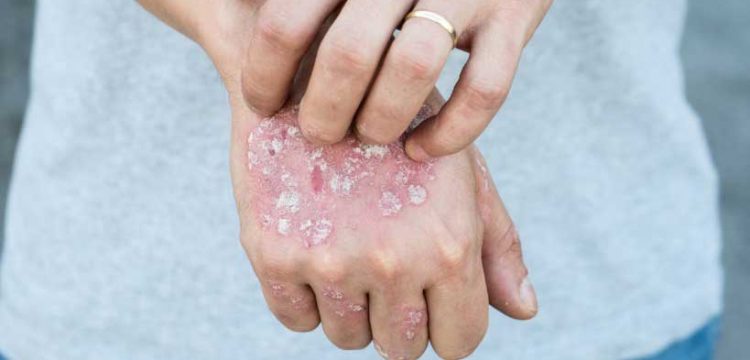Plaque psoriasis, a chronic skin condition affecting millions worldwide, often raises questions about its underlying nature. In this blog post, we’ll delve into the intricacies of plaque psoriasis, exploring its features and addressing the fundamental query: Is plaque psoriasis truly an autoimmune disease?
Furthermore, the most prevalent kind of psoriasis, plaque psoriasis, results in skin that is scaly and inflammatory in areas where skin cells proliferate quickly. There are various treatment options available despite the lack of a cure.
Treatment options might vary depending on the severity and include topical creams, phototherapy, and various medicines. So, without any further ado, let’s continue to learn more:
Plaque Psoriasis
Plaque psoriasis is a skin disorder characterized by the development of red, raised patches covered with a silvery-white buildup of dead skin cells, known as plaques. These plaques often appear on the elbows, knees, scalp, and lower back, causing discomfort and self-consciousness for those affected.
Is Plaque Psoriasis an Autoimmune Disease?
Recent research suggests a compelling link between plaque psoriasis and autoimmune dysfunction. The immune system, designed to protect the body, mistakenly targets healthy skin cells, triggering an inflammatory response and the rapid overproduction of skin cells—manifesting as the telltale plaques of psoriasis.
The Immune System’s Role
Understanding plaque psoriasis as an autoimmune disease implies that the immune system perceives the skin cells as foreign invaders and launches an attack. This chronic immune activation contributes to the persistent nature of plaque psoriasis, with flare-ups and remissions over time.
Managing Plaque Psoriasis Autoimmune Challenges
Well, if you are experiencing the condition of plaque psoriasis, then you are probably looking for treatment approaches that can help you in overcoming this autoimmune disease. Later on, in this blog, you will get to know about the treatment options for Plaque psoriasis:
Treatment Approaches
Various treatment options aim to manage plaque psoriasis, including topical creams, phototherapy, and systemic medications. Targeting the immune system to modulate its response has become a key focus in treating this autoimmune-driven condition.
Lifestyle Considerations
Beyond medical interventions, individuals with plaque psoriasis can benefit from lifestyle adjustments. Maintaining a healthy diet, managing stress levels, and avoiding triggers can help alleviate symptoms and reduce the frequency of flare-ups.
Biologic Treatments for Plaque Psoriasis
Drugs classified as biologics contain proteins derived from living cells. They function by reducing swelling or obstructing specific immune cells.
Biologics are utilized for moderate to severe psoriasis, just like systemic therapies. If other therapies have failed, a doctor may suggest them.
These medications are administered intravenously or by injection. Moreover, the options may include:
- Adalimumab
- Infliximab
- Etanercept
- Ustekinumab
- Certolizumab pegol
- Secukinumab
- Brodalumab
- Ixekizumab
- Guselkumab
- Tildrakizumab
- Golimumab
- Risankizumab
Using biologics may make you more susceptible to infection and TB. Consult a physician or dermatologist regarding the advantages and disadvantages of biologics if you’re considering using them.
Other therapies for Plaque Psoriasis
Plaque psoriasis may benefit from alternative therapy as well. While none offer permanent solutions, they could offer some comfort.
- Cut down on shower time: Extended contact with water might exacerbate itching. A similar thing can happen with hot showers.
- Moisturizing your Skin: After taking a bath or cleaning your hands, moisturize your skin by using moisturizing lotions. This can lessen itching and hydrate your skin.
- Apply a cold compress: To lessen irritation, apply a cold compress to the affected areas of your skin.
- Steer clear of triggers: Certain things, including stress, alcohol, or smoke, can make psoriasis flare up.
- Adopt a well-rounded diet: Pay attention to fruits, vegetables, and anti-inflammatory diets. Steer clear of the foods that make your psoriasis worse, such as processed meals, alcohol, and nightshade vegetables.
Intersection of Plaque Psoriasis and Autoimmunity
In conclusion, the connection between plaque psoriasis and autoimmune dysfunction unveils a deeper understanding of this common skin condition. Recognizing plaque psoriasis as an autoimmune disease underscores the importance of comprehensive treatment strategies that address the immune system’s role.
By staying informed about the latest research and treatment options, individuals living with plaque psoriasis can actively manage their condition and improve their quality of life.
For those seeking answers and insights into plaque psoriasis and its autoimmune nature, this blog post serves as a guide, shedding light on the complex relationship between the immune system and this prevalent skin disorder. Stay informed, stay proactive, and empower yourself in the journey to manage plaque psoriasis.
How Can Fuse Infusion Help You Overcome Plaque Psoriasis?
A biologic infusion center offers a monitored and regulated setting for the administration of biologic drugs, which is essential in assisting patients with plaque psoriasis. Systemic therapies known as biologics target particular immune system components that contribute to the development of psoriasis. The following are some ways that Fuse Infusion can help with plaque psoriasis management:
Expert Administration:
IV infusion is the usual method used to give biologic medicines. Trained medical personnel, such as nurses or infusion specialists, supervise the administration procedure at a specialized infusion center such as Fuse Infusion. This guarantees the safe and efficient administration of the drug.
Monitoring and Safety:
Throughout the entire process, patients getting biologic infusions are closely observed. This enables medical professionals to quickly handle any possible adverse reactions or side effects. Patient safety is improved by the infusion center’s regulated environment.
Ideal Absorption of Medication:
For biologics to be as effective and absorbed as possible, they must be administered precisely. With the ability to administer the proper amount and keep an eye out for any negative responses, infusion centers are prepared to manage the unique needs of each biologic medicine.
Convenient & Comfortable:
Infusion centers provide a comfortable setting for receiving treatment and are developed with patients in mind. This can enhance the patient experience and promote following the recommended course of care.
Regular Monitoring and Follow-Up:
Patients undergoing biologic infusion for plaque psoriasis often require ongoing treatment. The infusion center facilitates regular monitoring of the patient’s response to the medication, allowing healthcare providers to make adjustments to the treatment plan as needed.
Collaboration with the Healthcare Team:
The patient’s rheumatologist or dermatologist, who issues the prescription for the biologic drug, frequently collaborates with infusion centers. This guarantees a thorough and well-coordinated approach to the patient’s care.
Support:
Patients may receive support and instructional materials from infusion centers, which can aid in their understanding of the advantages and possible drawbacks of biologic therapy. Patients are more equipped to take an active role in their care and make wise decisions thanks to this information.
It’s crucial to remember that selecting a course of therapy, including using biologics, is a choice made in conjunction with a medical professional. The medical background and state of each patient should be taken into consideration while assessing the efficacy and safety of biologic therapy.
Contact Fuse Infusion for Plaque Psoriasis Treatment
If your doctor has recommended biologic infusion therapy treatment for plaque psoriasis, we at Fuse Infusion offer you the best treatment services. We treat plaque psoriasis through plaque psoriasis injections and help our patients in overcoming this chronic disease.
Each Fuse Infusion patient receives direct care and treatment from our licensed professionals throughout biological infusion therapy, providing thorough medical management.
From start to end, each patient receives individualized care. When required, on-call medical professionals are accessible.
At Fuse Infusion, we believe in offering premium-quality services to our patients. So, contact us to receive a biologic infusion today!

